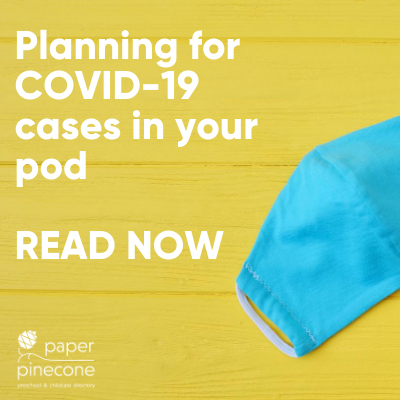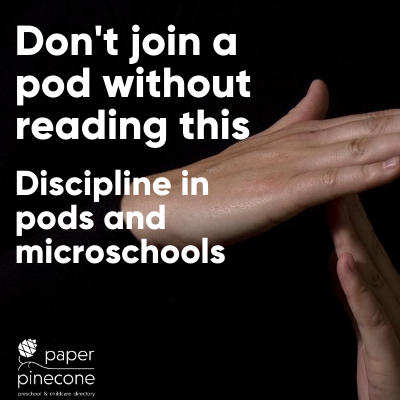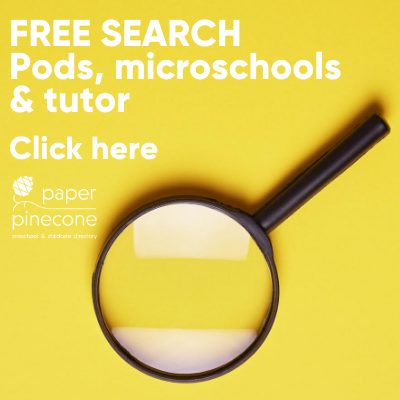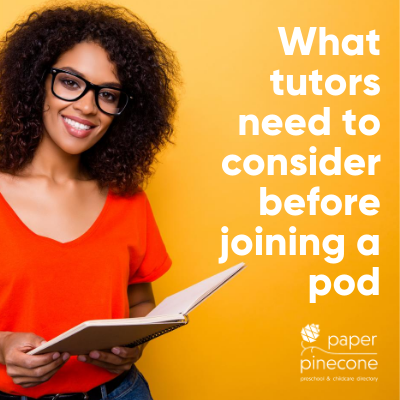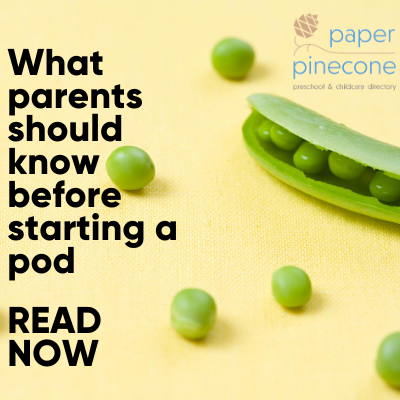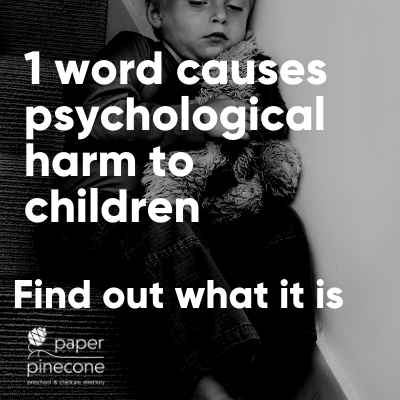Play-Based Learning in Preschool & Elementary Pandemic Pods
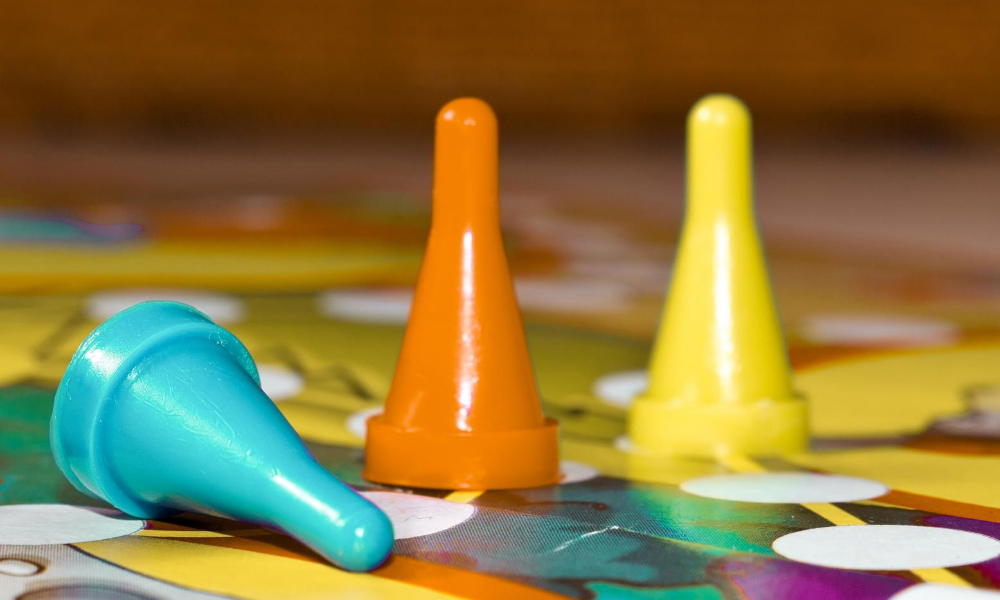
Published Date: 08/10/20
Free pod listing & search now available on Paper Pinecone. Get started.
For many who are starting and joining pandemic pods, the expectation exists that a tutor, teacher, or other pod leader will support a child’s learning. Distance learning, whether it be through live online sessions, pre-recorded videos, or independent work is not only not ideal, but it fundamentally is not how children learn.
We often talk about play-based learning in preschool or even kindergarten, but that type of learning shouldn’t end when a child enters first grade. Play-based learning and project-based learning are the best ways nearly all children learn and there’s an opportunity to establish and encourage it within your pandemic pod.
Even an experienced teacher or tutor may not be familiar with play-based learning and project-based learning. But, there’s good news…it often takes minimal effort and can be easily executed within a pandemic pod.
DOWNLOAD THE FREE QUESTIONNAIRE TO HELP YOU MATCH WITH POD FAMILIES
What is play-based learning within a pandemic pod?
Play-based learning is exactly what it sounds like – when children learn through play. The play can be self-guided free play, or instructor-directed guided play. It can include academic concepts as well as the social emotional concepts necessary for healthy development.
Within a pandemic pod it can take many shapes and forms and will be driven by the interests and ages of the children present.
Why use play-based learning within a pandemic pod?
According to child development expert Dr. Kathryn Hirsh-Pasek, there are four pillars required for humans to learn optimally.
- Individuals take an active role in the learning environment
- They are engaged
- Information is meaningful
- Learners interact in a social context
Play-based learning meets those criteria, though there can be instances where learners are playing outside of a social context.
Following these pillars, children are more motivated to learn, often eager to tackle subjects, and most importantly, they are often engrossed in the material without thinking of it as learning.
Play-based learning within a pandemic pod is the perfect complement to hour-long online sessions and endless worksheets. Children will better comprehend and retain the academics while continuing their social emotional education, which is typically absent from distance learning.
How can play-based learning be incorporated into pandemic pods?
As mentioned, there are two ways play-based learning can occur within a pandemic pod: through free play and through instructor-directed play.
During free play, social emotional learning is often at the forefront. Within a small group like a pandemic pod, children learn negotiation skills, cooperation, leadership, problem solving, critical thinking, and conflict resolution.
During instructor-guided play both academics and social emotional learning can take center stage.
Your tutor or pod leader can foster this learning in several ways.
Open-Ended Questions
Open-ended questions don’t have a yes or no answer, or even a simple one-word answer and are great tools for play-based learning within a pandemic pod. For example, if children are engaged in pretend play at your pod, there are a number of open-ended questions that can encourage learning. Instead of a pod leader asking, “What are you playing?” she or he might observe that the children are playing superhero and say, “How does being a superhero make you feel?” or “Why did you pick that superpower?” The latter questions require children to think through emotions and builds their social emotional skills.
Within an academic framework in a pandemic pod, open-ended questions can be used to develop critical thinking skills. An instructor may say, “Tell me how you think we should begin this work?” or “How do you think we can do this differently?”
Download some open-ended questions to get you or your pod leader started here.
Board games
Board games are a tremendous way to build both academic skills and social emotional skills within a pandemic pod. In cooperative games children learn teamwork and how to problem solve together. With competitive games, children are learning emotional regulation when they win or lose and rule following – nobody likes playing with someone who doesn’t follow the rules.
From an academic perspective, strategy is involved in nearly every board game and that requires critical thinking and problem solving and can be used as a play-based learning tool within pandemic pods. Beyond that, board games are great tools to practice math and reading within a pandemic pod and it takes hardly any energy to see those opportunities. With dice games, incorporate math skills. A child rolled a five and the next child rolled a 3. How many more spaces did the first child get to move? For all children, especially older children, remember that math isn’t just addition, subtraction, multiplication, and division. It includes multi-step problem solving skills, geometry, pattern recognition, logic, and graphic. The Mind Institute has published this list of board games to hone mathematical skills.
Of course, reading skills are incorporated into board games as well. Scholastic provides this list of board games to encourage literacy.
Get in the kitchen
Cooking and baking are always a phenomenal way to help children learn academic concepts in a fun way. It’s first a lesson in connecting the written word to the action – that’s what happens when you follow a recipe. It’s also, weights, measurements, fractions, and science – everything you bake is really a science experiment where ingredients combine to form something else.
A hired tutor in your pandemic pod may understandably not want to jump into your kitchen and start baking, but it if you’re in a co-op situation with other parents, they might be willing to whip up some cookies for a fun lesson with the kids. Smoothies are also a simple no-bake way to teach through cooking.
Even if your pandemic pod doesn’t end up turning on the oven, keep measuring cups and measuring spoons out for math lessons. Pick up a bag of dry rice or beans and all of a sudden, your math lesson becomes hands-on, practical, and play-based.
The final word
Utilizing play-based learning in a pandemic pod doesn’t require much effort, it simply requires a pod leader who knows how to facilitate it. When establishing your pod, speak with the other families and the tutors you’re interviewing about their experience with play-based learning. Most importantly, ensure you communicate your expectations, so all families and employees are on the same page. Doing so will make for a successful pandemic pod and keep children learning academically, socially, and emotionally. Get your pod started by posting and searching listings free.
Paper Pinecone is the leading childcare resource giving you access to the best preschools, daycares, before/after school programs, pods and tutors. Parents always search free and childcare providers always list free. Send inquiries about daycare, preschool, pandemic pods, and microschools to [email protected].
- stacey's blog
- Log in or register to post comments
